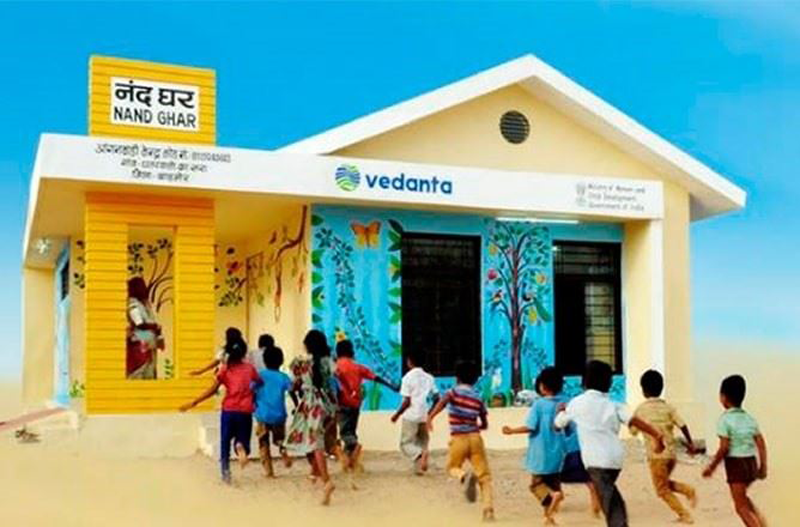Healthy mothers make healthy nation; healthy children make future of nation great. United Nations Sustainable Development Goal (SDGs) No. 3 talks about good health and well-being for all however most important is the health and well-being of mother & child.
Dhanush Foundation, an organisation with expertise in providing primary healthcare services, supporting Vedanta Foundation (philanthropic arm of the Vedanta Resources) important program called ‘NandGhar’. The ‘NandGhar’ program is flagship CSR initiative of Vedanta Foundation in partnership with Ministry of Women and Child Development. It aims to go beyond the traditional functions of an Anganwadi Centers (AWC) by playing a pivotal role in development of rural communities. The program has been designed with a vision to transform women and child development in India by disrupting the status quo. Nandghar works on following thematic areas to ensure holistic development of community:
- 3-6-year-old child’s preschool education using e-learning and intelligent kits
- Providing children, pregnant women, and nursing mothers with nourished hot meals while strengthening the government’s existing systems for providing services
- Providing healthcare via a mobile medical vehicle and availability of specialized medical professionals via a tele-consultancy approach
- Women empowerment through skill training and entrepreneurship development
Our contribution as Healthcare Partner
Dhanush Foundation take pride in working as healthcare service partner for the program that ensures good health and wellbeing especially for mother and child. We are providing services to approx. 300 NandGhars across Chhattisgarh, Odisha, Jharkhand and Karnataka since April 2021. We are catering to approx. 2100 beneficiaries every month across these centres in providing primary healthcare.
As a healthcare service provider, we are providing following holistic healthcare services:
- Healthcare services exclusive to NandGhar beneficiaries
- Targeted and focused health intervention for children and women on general services and specific services as obtained through needs assessment
- Health services to Community (including NandGhar beneficiaries)
- Basic out-patient services
- Routine check-ups
- Provisioning OTC medicines
- Referrals for severe health cases
- Basic non-invasive tests
- Pregnancy care services
- Health screening and check-ups
Additional services
- Capacity-building of community health workers
- Health information management systems for storage and retrieval of patient health records
- Spreading awareness about health issues and medical resources with means of IEC/BCC (Information, Education and Communication and Behavioural Change Communication) activities
- Strengthening of government healthcare system:
- Capacity building of Frontline Health Workers (FLWs) to enable them to effectively deliver their responsibilities as outlined by Ministry of Health and Family Welfare (MoHFW) and the Ministry of Women and Child Development (MoWCD).
- Strengthening of village-level platforms such as Village Health, Sanitation & Nutrition Committee (VHSNC) for improving health awareness and access to healthcare services.
- Establishing and enhancing referral pathways to streamline care, reduce case load on tertiary health facilities, and ensure early identification and treatment of cases.
- Focus of system strengthening efforts should be on fortifying the long-term sustainability of rural healthcare services.
Outcome and Impact
- Primary healthcare to approx. 300 NandGhars across four states; Chhattisgarh, Odisha, Jharkhand and Karnataka.
- These Nandghars cover following districts:
- Odisha – Kalahandi, Rayagada, Ganjam
- Chattisgarh – Durg, Balod
- Jharkand – Bokaro
- Karnataka – Dharwad
- Catering to approx. 2100 beneficiaries every month
- Impacting more than 5,000 beneficiaries each month through awareness, preventive healthcare, mother & childcare, government healthcare scheme etc.


